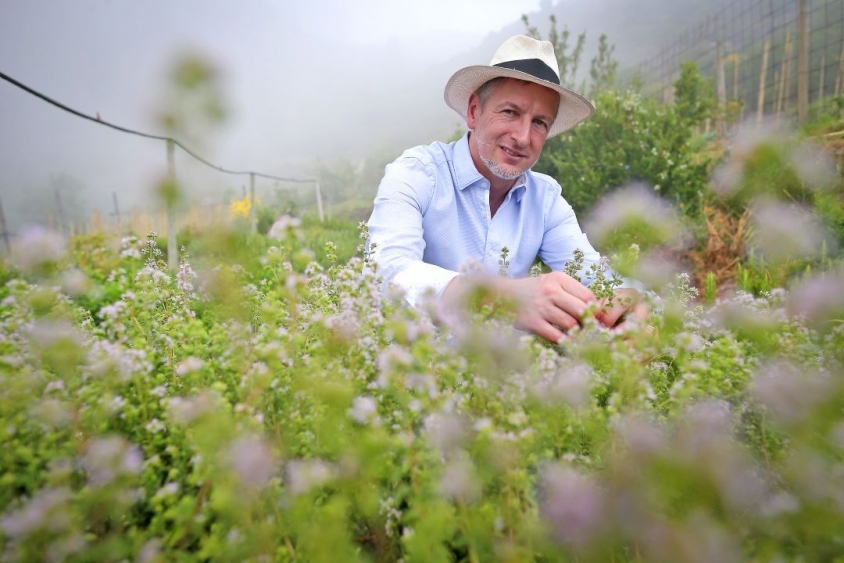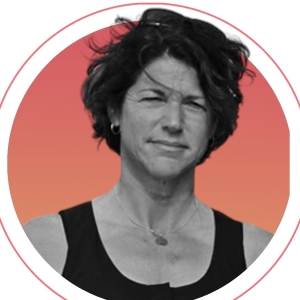
Forget starry eyed. The world’s first 100% organic Michelin chef sets his sights on honest gastronomy.
A few dinner forks were dropped in Monaco mid-July when Paolo Sari, the first chef to be awarded a Michelin star for a 100% organic restaurant, threw in the apron at Elsa, SBM’s seasonal restaurant at Monte Carlo Beach that he had headed since 2012.
On the timing of his mid-season departure, the Venice native explains, from the bar at the Meridien Beach Plaza in Larvotto, that the split was “amicable.” “It wasn’t okay for a long time,” he says in a water-under-the-bridge kind of way. “Over the last seven years, I concentrated on making the country organic and tried to fight for change. You’d think a small place is easier. I thought I would’ve been able to do more.”
For Sari, the direction of today’s restaurant industry is “completely wrong.” On the one hand, cheap and unidentifiable “food that kills you to pay the bills.” On the other, over-priced gastronomy with pretty packaging recognized by guides, TV shows, and alternative press, like bloggers. “This type of cooking hides behind the brand and tries to sell people on emotion. It’s like opening a gift box that’s empty inside.
“The restaurant business needs to wake up,” asserts Sari, who, with his piercing gray eyes and impeccable casual wear could pass as a J. Crew model.
His “simple, healthy and natural” food received a star in 2014 and relied on small organic farmers within a 50-kilometer radius of Monaco, a network which had taken the chef years to develop.
“People want to go ‘that restaurant’ because someone tells them to go there. And they measure value on how much they spend. A super Michelin-star restaurant in Monaco is attractive to tourists but when that restaurant with 60 employees is losing €2 million a year, what kind of image does that give?”
I’m trying to develop an alternative gastronomy, a pure organic vision for restaurants and a real choice for the consumer over the next ten years.
So what’s the solution? “Provide a real bill of the value,” says Sari, who in 2014 created the BioChef Global Spirit, an association that puts on Monaco’s annual organic food fare, the Route du Goût, as well as developing humanitarian projects like the Moné and Paolo Sari Hotel and Organic Culinary Institute, which opened in Madagascar last year.
“I’m trying to develop an alternative gastronomy—there needs to be pure honesty in the dish, in the service, in the purchasing, and in the communication—and so on January 1, 2020, I will launch my food revolution.”
No new restaurant opening is planned for the moment. “I can’t reach the public from the kitchen, I have to be on the ground.”
But the BioChef will be more than just a consultant. “For every revolution, we need a leader. We need to wake the people up.” The former Four Seasons London chef will be creating an ecosystem with a package for hotels, restaurants, and chefs that don’t have an identity because either they are starting out or their supergastronomy got lost in translation. “Not every restaurant can afford to lose €2 million a year.”
BioChef’s “foodalism” movement already has a certification company on board, along with a pure source water company located between France, Italy and Monaco that dedicates part of its sales to buying machines for filtering seawater. In addition to creating a circular economy with local producers, fishermen, millers and bakers, other partnerships involve a fair- trade organic coffee company that reinvests profits in solar panels in the community, and a producer of 100% recycled kitchen equipment.
“A very good restaurant should earn merits for ethically purchased local sources, not products arriving from 10,000 kilometers away.
“For example, after 12 years Prince Albert has reinstated tuna fishing in Monaco with a quota dedicated to one fisherman. And even though he arrives in the port every morning, 100 meters from the restaurants, they still buy from the Maldives or Indian Ocean or Sri Lanka because its costs 2 euro less per kilo, using the excuse that tuna is banned in Monaco.”
Sari insists that residents and tourists equate being close to the sea with eating the freshest fish. “It’s not true. On the Riviera and in Provence, we consume only 2% of local fish. In the summer, with sea temperatures around 24°C, there is no sea bass or dorade, only anchovies and sardines. Your 3-kilo sea bream and clams in your spaghetti arrive from the north ... frozen!”
Prior to his arrival in Monaco, Sari worked in a hotel kitchen on the volcanic island of Jeju, 160 kilometers off the coast of South Korea, where he also spent 3 months at a Buddhist monastery. He described the monks as “healthy, peaceful people” and that “in its simplicity, their food was delicious.”
The 51-year-old is adamant that “the most precious thing you have in this world is your health and what you eat is the first prevention. You can shorten your life and die miserably or extend your life.
“Seasonal food protects you but these days everything can be repaired by pharmaceuticals. This gives you a headache? Buy
a painkiller. That gives you indigestion? Buy antacids. Yet chemical pharmaceuticals are like a bomb as they also kill the protective elements.”
No matter how his honest food revolution unfolds after January 1, Paolo Sari can boast what no one else in the world can: he had the first ever 100% organic restaurant. “The fact that Michelin recognized me meant that I was right, that being organic and respectful to nature could be a winning combination.”

